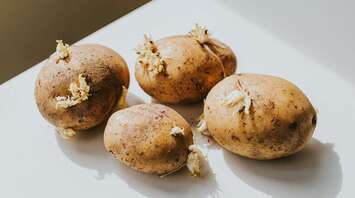Is It Safe to Eat Sprouted Potatoes? What Experts Say

Potatoes are not only versatile but also nutritious. They offer many health benefits, being rich in fiber, vitamins, and minerals. Some potatoes, however, can accumulate natural toxins that can lead to illness. Thus, monitoring stored potatoes' appearance is crucial.
According to Lauren Harris-Pincus, M.S., RDN, and author, "Potatoes contain two kinds of glycoalkaloids — solanine and chaconine. The highest concentration is found in the eyes, green skin, and sprouts."
The green color comes from chlorophyll. Although chlorophyll is not toxic, it indicates higher concentrations of glycoalkaloids. "Fresh potatoes should not have sprouts or any green on the skin," notes Harris-Pincus.
As potatoes age or if they're improperly stored, they may sprout and develop green patches. If you notice any sprouting, either remove the sprouts or discard the entire potato, depending on the situation.
Dangers of Eating Sprouted Potatoes
Sprouting indicates high toxin levels. Consequently, the potato is unsafe to eat. Creative experts like Diana M. Pei, Pharm. D., highlight that solanine and chaconine can cause various symptoms including vomiting and abdominal pain. Other symptoms may include headache, diarrhea, or fever.
Although there have been cases resulting in death linked to toxic potatoes, symptoms often manifest a few hours after consumption. Most cases can be treated at home.
How to Reduce Toxicity
To stay safe, it is best to discard any potatoes with sprouting or green spots. However, if you notice minor sprouting or discoloration, cutting them off is sometimes possible. That said, this practice is not highly recommended. Harris-Pincus emphasizes, "Cooking does not eliminate these toxins."
If the potato doesn't have wrinkles or shriveling, you might still use it if damaged areas are completely removed. When eating potatoes with skin, extra caution is necessary, as toxins often reside there. "After removing sprout and eyes, if any green remains, discard the potato," Harris-Pincus advises.
Storing Potatoes to Prevent Sprouting
While purchasing potatoes in bulk may seem convenient, buy only what you need to avoid waste. Store your potatoes in a cool, dark area out of direct sunlight. They should also be kept away from onions, which can speed up sprouting.
Ideal conditions include a cool, dark, and airy environment, such as cupboards or pantries. High temperatures and direct sunlight can result in toxic build-up. Moreover, avoid refrigerating or freezing potatoes unless they are partially cooked. According to Harris-Pincus, temperatures below 50°F turn starches into sugars, causing discoloration when cooked.
Store them loosely at room temperature in a wire basket. Wait to wash them until you’re ready to cook to prevent spoilage.
Final Notes
Potatoes can be a healthy part of any diet. Green spots or sprouts indicate the potential presence of toxins. Always dispose of such potatoes unless you can safely remove affected parts. Proper storage in suitable conditions can help prevent sprouting and spoilage...
Earlier, SSP told how to easily remove peanut skin.



















